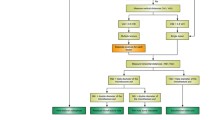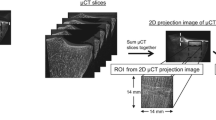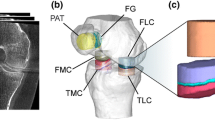Abstract
Introduction
The validity of histopathological grading is a major problem in the assessment of articular cartilage. Calculating the cumulative strength of signal intensity of different stains gives information regarding the amount of proteoglycan, glycoproteins, etc. Using this system, we examined the medium-term effect of subchondral lesions on initially healthy articular cartilage.
Materials and methods
After cadaver studies, an animal model was created to produce pure subchondral damage without affecting the articular cartilage in 12 beagle dogs under MRI control. Quantification of the different stains was provided using a Photoshop-based image analysis (pixel analysis) with the histogram command 6 months after subchondral trauma.
Results
FLASH 3D sequences revealed intact cartilage after impact in all cases. The best detection of subchondral fractures was achieved with fat-suppressed TIRM sequences. Semiquantitative image analysis showed changes in proteoglycan and glycoprotein quantities in 9 of 12 samples that had not shown any evidence of damage during the initial examination. Correlation analysis showed a loss of the physiological distribution of proteoglycans and glycoproteins in the different zones of articular cartilage.
Conclusion
Currently available software programs can be applied for comparative analysis of histologic stains of hyaline cartilage. After subchondral fractures, significant changes in the cartilage itself occur after 6 months.





Similar content being viewed by others
References
Arokoski JP, Jurvelin JS, Vaeataeinen U, Helminen HJ (2000) Normal and pathological adaptations of articular cartilage to joint loading. Scand J Med Sci Sports 10:186–198
Buckwalter JA, Mankin HJ (1997) Articular cartilage. Part I. Tissue design and chondrocyte-matrix-interactions. J Bone Joint Surg Am 79:600–611
Buckwalter JA, Mankin HJ (1997) Articular cartilage. Part II. Degeneration and osteoarthrosis, repair, regeneration, and transplantation. J Bone Joint Surg Am 79:612–632
Consensus document (1998) The bone and joint decade 2000–2010 for prevention and treatment of musculo-skeletal disorders. Acta Orthop Scand 69:67–86
Dedrick DK, Goldstein SA, Brandt KD, O’Connor BL, Goulet RW, Albrecht M (1993) A longitudinal study of subchondral plate and trabecular bone in cruciate-deficient dogs with osteoarthritis followed up for 54 months. Arthritis Rheum 36:1460–1467
Dekel S, Weissman SL (1978) Joint changes after overuse and peak overloading of rabbit knees in vivo. Acta Orthop Scand 49:519–528
Disler D (1997) Fat-suppressed three-dimensional spoiled gradient-recalled MR imaging: assessment of articular and physeal hyaline cartilage. AJR 169:1117–1123
Donohue JM, Buss D, Oegema TR, Thompson RC (1983) The effect of indirect blunt trauma on adult canine articular cartilage. J Bone Joint Surg Am 65:948–957
Faber KJ, Dill JR, Amendola A, Thain L, Spouge A, Fowler PJ (1999) Occult osteochondral lesions after anterior cruciate ligament rupture. Six-year magnetic resonance imaging follow-up study. Am J Sports Med 27:489–494
Gatlin CL, Schaberg ES, Jordan WH, Kuyatt BL, Schmith WC (1993) Point counting on the Macintosh, a semiautomated image analysis technique. Anal Quant Cytol Histol 15:345–350
Ikeda I, Urishihara K, Ono T (1997) Widefield microscopy images of tissue sections by computer imaging techniques injuries. J Histochem Cytochem 45:446–461
Imhof H, Sulzbacher I, Grampp S, Czerny C, Youssefzadeh S, Kainberger F (2000) Subchondral bone and cartilage disease: a rediscovered functional unit. Invest Radiol 35:581–588
Irie K, Yamada T, Inove K (2000) A comparison of magnetic resonance imaging and arthroscopic evaluation of chondral lesions of the knee. Orthopaedics 23:561–564
Irrgang JJ, Pezullo D (1998) Rehabilitation following surgical procedures to address articular cartilage lesions in the knee. J Orthop Sports Phys Ther 28:232–240
Johnson DL, Bealle DP, Jefferson CB Jr, Nyland J, David NMC (2000) The effect of a geographic lateral bone bruise on knee inflammation after acute anterior cruciate ligament rupture. Am J Sports Med 28:152–155
Johnson DL, Urban WP Jr, Caborn DNM, Vanarthos WJ, Carlson CS (1998) Articular cartilage changes seen with magnetic resonance imaging detected bone bruises associated with acute anterior cruciate ligament rupture. Am J Sports Med 26:409–414
Kawak CE, McIlwraith CW, Norrdin RW, Park RD, James SP (2001) The role of subchondral bone in joint disease: a review. Equine Vet J 33:120–126
Kawamura S, Wakitani S, Kimura T, Maeda A, Caplan A, Shino K, Ochi T (1998) Articular cartilage repair. Acta Orthop Scand 69:56–62
Lahm A, Erggelet C, Steinwachs MR, Reichelt A (1998) Articular and osseous lesions in recent ligament tears: arthroscopic changes compared with magnetic resonance imaging findings. Arthroscopy 14:597–604
Lahm A, Erggelet C, Steinwachs MR, Reichelt A (2000) Arthroscopic management of osteochondral lesions of the talus: results of drilling and usefulness of magnetic resonance imaging before and after treatment. Arthroscopy 16:299–304
Lehr HA, Loos CM van de, Teeling P, Gown AM (1999) Complete chromogen separation and analysis in double immunohistochemical stains using Photoshop-based image analysis. J Histochem Cytochem 47:119–126
Lotke PA, Ecker ML, Barth P, Lonner JH (2000) Subchondral magnetic resonance imaging changes in early osteoarthritis associated with tibial osteonecrosis. Arthroscopy 16:76–81
Lynch TC, Crues JV 3rd, Morgan FW, Sheehan WE, Harter LP, Ryu R (1998) Bone abnormalities of the knee: prevalance and significance at MR imaging. Radiology 171:761–766
Mink JH, Deutsch AL (1989) Occult cartilage and bone injuries of the knee: detection, classification and assessment with MR imaging. Radiology 170:823–829
Ostergaard K, Andersen CP, Petersen J, Bendtzen K, Salter DM (1999) Validity of histopathological grading of articular cartilage from osteoarthritic knee joints. Ann Rheum Dis 58:208–213
Panula HE, Nieminen J, Parkkinen JJ, Arnala I, Kröger H, Alhava E (1998) Subchondral bed remodeling increases in early experimental osteoarthritis in young beagle dogs. Acta Orthop Scand 69:627–632
Potter HG, Linklater JM, Allen AA, Hannafin JA, Haas SB (1998) Magnetic resonance imaging of articular cartilage in the knee. An evaluation with use of fast-spin-echo imaging. J Bone Joint Surg Am 80:1276–1284
Pritzler KPH (1994) Animal models for osteoarthritis: processes, problems and prospects. Ann Rheum Dis 53:406–420
Radin EL, Rose RM (1986) Role of subchondral bone in the initiation and progression of cartilage damage. Clin Orthop 213:34–40
Rangger C, Kathrein A, Freund MC, Klestil T, Kreczy A (1998) Bone bruise of the knee: histology and cryosections in 5 cases. Acta Orthop Scand 69:291–294
Smolle J (1996) Optimization of linear image combination for segmentation in red-green-blue images. Anal Quant Cytol Histol 18:323–329
Stein LN, Fischer DA, Fritts HM, Quick DC (1995) Occult osseous lesions associated with anterior cruciate ligament tears. Clin Orthop 313:187–193
Thompson RC Jr, Oegema TR Jr, Lewis JL, Wallace L (1991) Osteoarthrotic changes after acute transarticular load. J Bone Joint Surg Am 73:990–1001
Uhl M, Allmann KH, Tauer U, Laubenberger J, Adler CP, Ihling C, Langer M (1998) Comparison of MR sequences in quantifying in vitro cartilage degeneration in osteoarthritis of the knee. Br J Radiol 71:291–296
Uhl M, Ihling C, Allmann KH, Laubenberger J, Tauer U, Adler CP, Langer M (1998) Human articular cartilage: in vitro correlation of MRI and histologic findings. Eur Radiol 8:1123–1129
Zavatsky AB, Beard DJ, O’Connor JJ (1995) Cruciate ligament loading during isometric muscle contractions: a theoretical basis for rehabilitation. Am J Sports Med 22:418–423
Acknowledgement
This study was supported generously by the Wissenschaftliche Gesellschaft Freiburg i. Br.
Author information
Authors and Affiliations
Corresponding author
Rights and permissions
About this article
Cite this article
Lahm, A., Uhl, M., Lehr, H.A. et al. Photoshop-based image analysis of canine articular cartilage after subchondral damage. Arch Orthop Trauma Surg 124, 431–436 (2004). https://doi.org/10.1007/s00402-004-0701-6
Received:
Published:
Issue Date:
DOI: https://doi.org/10.1007/s00402-004-0701-6




